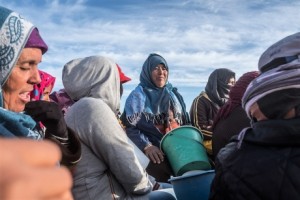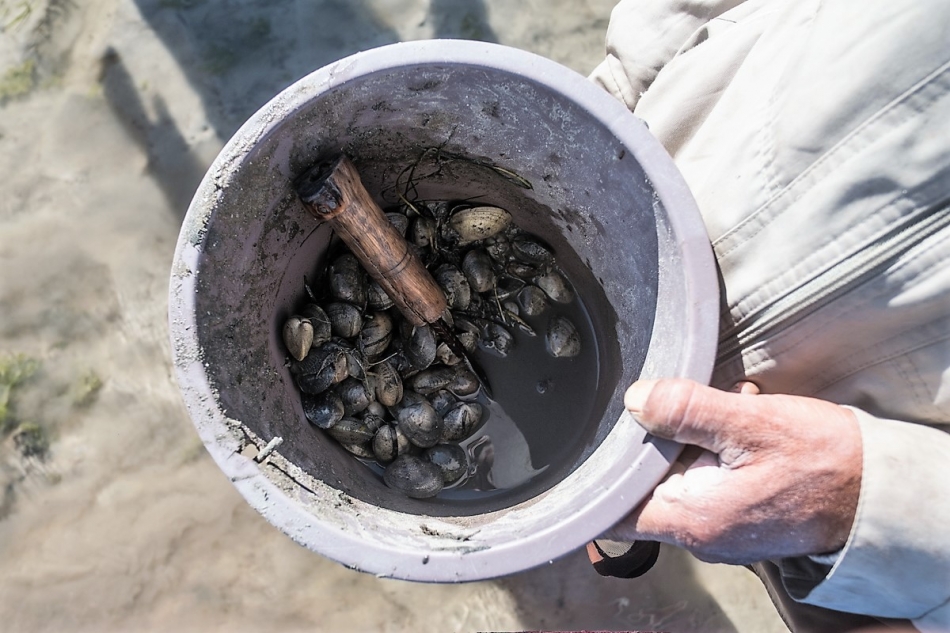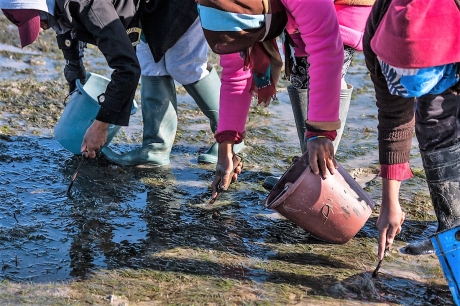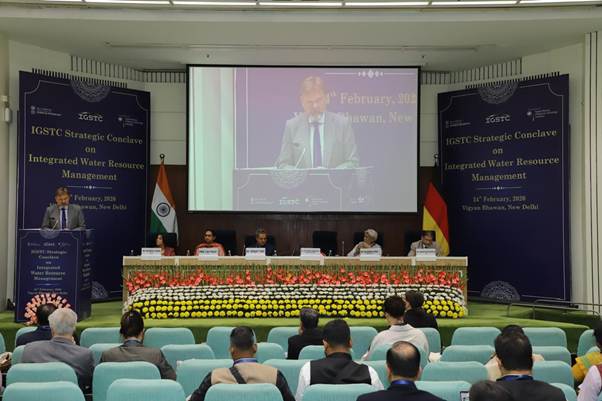
©FAO/Amine Landouls
Turning a crisis into opportunity in Tunisia-2
The best clams for the classic Italian dish spaghetti alle vongole actually come from Tunisia
Tunisian clams are increasingly sought-after for their rich taste, helping boost livelihoods for many Tunisian women.

Tunis: Did you know that the best clams for the classic Italian dish spaghetti alle vongole actually come from across the sea in Northern Africa? The Tapes decussatus autochthonous clam is native to waters surrounding the coasts of Tunisia, Libya, Egypt and Morocco and, thanks to its superior quality and taste, is highly popular with chefs.
Rather than being harvested through automated processes, the North African Tapes decussatus autochthonous clams are still gathered by hand, guaranteeing a high quality product. In Tunisia, many of these sought-after clams are collected by women who work long days under the hot sun. Their direct involvement often ended after the harvest and they would earn less than USD 1 per kilo.
Fairer prices for good work
Realizing that there is a strong demand for the product just across the Mediterranean Sea in Italy and Southern Europe, Food and Agriculture Organization (FAO) of the United Nations launched a project in the Gulf of Gabes, one of Tunisia’s prime clam-harvesting areas, in order to improve the efficiency of the value chain and therefore increase the income for the women clam collectors.
Also read: The evolution of blue crab fisheries in Tunisia
In this specific pilot programme, FAO, the women’s association, the Italian importer and a depuration center in Sousse, Tunisia worked together to make the value chain shorter and more effective. The women now bring the clams to the centre and weigh them themselves and, in many cases, the women were able to triple their earnings.
“This new pricing increases our income and allows us to improve our families’ standard of living,” says Houda Mansour, one of the female clam collectors in the area of Zaboussa on the Gulf of Gabes.
In the past, she and her fellow workers were completely dependent on specific market conditions where the purchase price was very low, and it was difficult for them to negotiate better prices. With the help of FAO’s project, Houda and her fellow clam gatherers, organized associations to give them a stronger say in the process.
“A few months ago, we were still kept off the market, with no power in the decision-making process. Now, we make our voice heard. Lately, I was so proud to see that my mum, president of the Association of Women Clam collectors and Development, participated in a meeting with the Director-General of Fisheries and that the Minister of Agriculture himself came to shake her hand and listened to her concerns about the clam sector,” states Houda.
Increasing sustainability and enhancing social protection

The project has also incorporated simple sustainability methods into the process. The women collecting the clams have price incentives to harvest only the bigger ones, allowing for the juvenile clams to mature for the next season. This not only allows the clams to repopulate, but it also ensures the continuity of the women’s livelihoods for years to come.
In addition, FAO has also supported the creation of a databank of female clam collectors in specific regions of Tunisia in order to facilitate the government’s ability to provide social security coverage. The government now has a clearer idea of the background, education and incomes of the women working in this industry, bringing them into the public sphere and helping the government support them, their industry and its resources.
The results achieved so far are a huge step forward, but the project does not stop there. FAO continues to work towards achieving fairer prices for clam collectors in the area, not only through this project but also by creating more sustainable livelihoods throughout the year. The clam-collecting season only lasts for six months, leaving many women without permanent work for the other six months of the year. To create more consistent livelihood opportunities, FAO is working through the Blue Hope Project with local associations, including women clam collectors, in the coastal areas of Tunisia to boost sustainable eco-tourism. Encouraging tourists to take an interest in the unique way the local communities gather fish and cook with it will boost income for local communities and develop more sustainable value chains all year round.
Afterall, women must have access to equal economic opportunities if we are to end poverty, eradicate hunger and achieve the Sustainable Development Goals!
Source: the FAO News and Media office
– global bihari bureau





